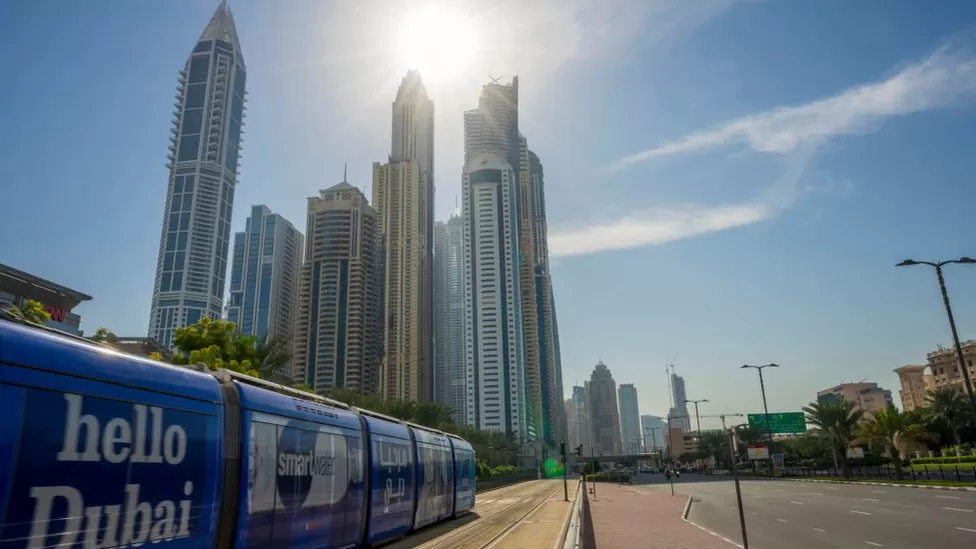World leaders are set to discuss tackling climate change at a big UN summit in Dubai.
It follows a year of extreme weather events in which many climate records have been broken.
What is COP28 and where is it?
COP28 is the 28th annual United Nations (UN) climate meeting where governments will discuss how to limit and prepare for future climate change.
The summit is being held in Dubai, in the United Arab Emirates (UAE), from 30 November until 12 December 2023.
COP stands for “Conference of the Parties”, where the “parties” are the countries that signed up to the original UN climate agreement in 1992.
Why is holding COP28 in Dubai controversial?
The UAE is one of the world’s top 10 oil-producing nations.
It has appointed the chief executive of the state-owned oil company, Sultan al-Jaber, president of the COP28 talks.
Oil – like gas and coal – is a fossil fuel. These are the main causes of climate change because they release planet-warming greenhouse gases like carbon dioxide when burned for energy.
Jaber’s oil company plans to expand production capacity.
Documents leaked to the BBC suggest the UAE planned to use its role as host to strike oil and gas deals.
Jaber has previously argued that he is uniquely well-placed to push for action from the oil and gas industry, and that as chairman of renewable energy firm Masdar, he has also overseen the expansion of clean technologies like wind and solar power.
Why is COP28 important?
It is hoped COP28 will help keep alive the goal of limiting long-term global temperature rises to 1.5C. This was agreed by nearly 200 countries in Paris in 2015.
The 1.5C target is crucial to avoid the most damaging impacts of climate change, according to the UN’s climate body, the Intergovernmental Panel on Climate Change (IPCC).
Long-term warming currently stands at about 1.1C or 1.2C compared with pre-industrial times – the period before humans started burning fossil fuels at scale.
However, recent estimates suggest the world is currently on track for about 2.4C to 2.7C of warming by 2100, although the exact numbers are uncertain.
As a result, the window for keeping the 1.5C limit in reach is “rapidly narrowing”, the UN says.
What will be discussed at COP28?
As well as progress towards the existing Paris goals, COP28 will concentrate on:
fast-tracking the move to clean energy sources, to “slash” greenhouse gas emissions before 2030 delivering money for climate action from richer to poorer countries, and working on a new deal for developing nations focusing on nature and people making COP28 the “most inclusive” ever
There will also be themed days on issues including health, finance, food and nature.
Who will be at COP28?
More than 200 governments are invited.
US President Joe Biden and China’s Xi Jinping are not expected to attend, but both countries will be represented.
UK Prime Minister Rishi Sunak will take part, and Buckingham Palace has confirmed that King Charles will also attend. He will deliver an opening address to delegates on 1 December.
Environmental charities, community groups, think tanks, businesses and faith groups will also take part.
Hundreds of delegates with links to fossil fuels attended COP27 in 2022.
What are COP28 sticking points likely to be?
There is likely to be disagreement about the future of “unabated” fossil fuels – coal, oil and gas which are burned without technologies to capture their emissions.
Jaber has called for a “phase down” in their use, meaning a reduction over time, but not a complete end. However, the European Union is expected to push for a full “phase out”.
Climate campaigners point out that restricting agreements to “unabated” fossil fuels would allow some production to continue. They say there is no guarantee capturing emissions will work at scale.
Money will also be an issue.
At COP27, a “loss and damage” fund was agreed for richer countries to pay poorer countries facing the effects of climate change.
But exactly how this will work is still unclear. The US, for example, has ruled out paying climate reparations for its historical emissions.
In 2009, developed countries committed to give $100bn (£82bn) a year, by 2020, to developing countries to help them reduce emissions and prepare for climate change.
The target was missed but is expected to be reached in 2023.
Will COP28 make any difference?
Critics of previous COPs, including campaigner Greta Thunberg, accuse the summits of “greenwashing”: that is, countries and businesses promote their climate credentials without making the changes needed.
But as world leaders gather, the summits offer potential for global agreements that go beyond national measures.
For example, the 1.5C warming limit, agreed in Paris at COP21, has driven “near-universal climate action”, according to the UN.
(With inputs from BBC)









Comment